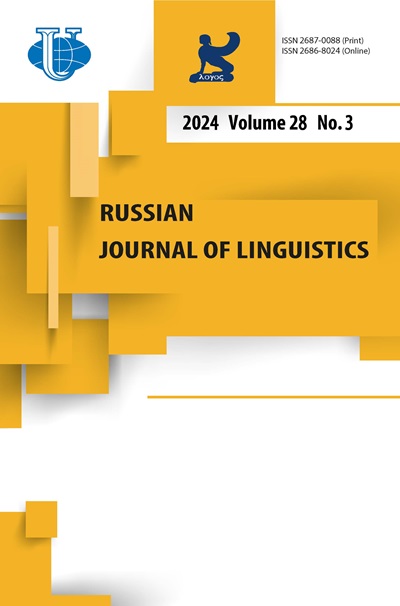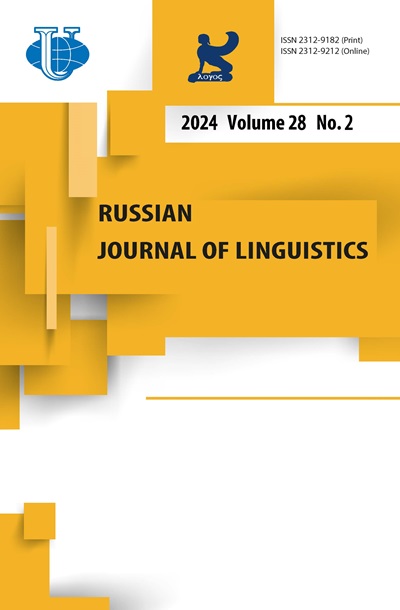Сохранение лица в электронной переписке преподавателей и студентов
- Авторы: Цуму Ж.М.1
-
Учреждения:
- Европейский университет Мадрида
- Выпуск: Том 28, № 2 (2024)
- Страницы: 243-265
- Раздел: Статьи
- URL: https://journals.rudn.ru/linguistics/article/view/39432
- DOI: https://doi.org/10.22363/2687-0088-35650
- EDN: https://elibrary.ru/CXPOZR
Цитировать
Полный текст
Аннотация
В современном высшем образовании можно отметить две важные тенденции: (1) вызванное глобализацией расширение и влияние английского языка и (2) широкое использование электронной переписки, ставшей одной из основных форм общения в академической среде, особенно среди преподавателей и студентов. Хотя электронная коммуникация в сфере образования является объектом многих исследований, в центре внимания находятся в основном нацеленные на поддержание лица стратегии студентов. Чтобы устранить этот дисбаланс, в данной статье ставится цель проанализировать как стратегии студентов (в электронных письмах, содержащих запросы о поздней сдаче заданий, посещении занятий и т. д.), так и стратегии преподавателей (в ответных письмах). Качественный анализ 20 примеров взаимодействия преподавателя и студента, проведенный с использованием теории конституирования лица, выявил различия в стратегиях, используемых студентами и преподавателями для поддержания лица. Результаты показывают, что студентов главным образом заботит их собственное лицо, в то время как преподаватель стремится избегать конфликтов в учебном процессе, проявляя заботу о своем лице, лице студентов и сохранении гармонии в классе. Таким образом, «управление лицом» является сложным и динамичным процессом, позволяющим совместно создавать и утверждать идентичности участников коммуникации. Например, если действия студентов не учитывают важности отношений взаимозависимости между ними, их однокурсниками и преподавателем, которые имеют решающее значение для гармонии в учебном процессе, преподаватель отдает предпочтение единению, а не разобщенности. Кроме того, результаты показывают, что культурные различия между преподавателем и студентами не всегда влияют на стратегии сохранения лица при общении по электронной почте.
Об авторах
Жан Матье Цуму
Европейский университет Мадрида
Автор, ответственный за переписку.
Email: 190589jeanmathieu@gmail.com
ORCID iD: 0000-0002-4651-9161
получил степень PhD в области англистики и степень магистра по лингвистике в Университете Комплутенсе (Мадрид, Испания). В настоящее время преподает английский для специальных целей (ESP) в Европейском университете Мадрида. Сферу его научных интересов составляют прагматика, многоязычие, (не)вежливость, дискурс-анализ, социолингвистика и политология. Имеет публикации в международных журналах, включая Journal of Pragmatics и Journal of Politeness: Language, Behaviour, Culture.
Мадрид, ИспанияСписок литературы
- Alemi, Minoo & Zahra Maleknia. 2023. Politeness markers in emails of non-native English speaking university students. Russian Journal of Linguistics 1 (27). 67-87. https://doi.org/10.22363/2687-0088-33334
- Almoaily, Mohammad. 2018. Greetings as a Politeness Strategy in EFL Distance Learning Students' Official Emails. Linguistics and Literature Studies 6 (6). 259-266.
- Arundale, Robert. 2006. Face as relational and interactional: A communication framework for research on face, facework, and politeness. Journal of Politeness Research 2. 193-216.
- Arundale, Robert. 2013. Face as a research focus in interpersonal pragmatics: Relational and emic perspectives. Journal of Pragmatics 58.108-120.
- Bjorge, Anne Kari. 2007. Power distance in English lingua franca email communication1. International Journal of Applied Linguistics 17. 60-80.
- Bou-Franch, Patricia. 2011. Openings and closings in Spanish email conversations. Journal of Pragmatics 43. 1772-1785.
- Brown, Penelope & Stephen C Levinson. 1987. Politeness. Some Universals in Language Usage. Cambridge: Cambridge University Press.
- Codina-Espurz, Victòria. 2021. The influence of social distance and power in email politeness in an academic context. Estudios Interlingüísticos 9. 44-59.
- Eckert, Penelope & Sally McConnet-Ginet. 1992. Think practically and look locally: Language and gender as community-based practice. Annual Review of Anthropology 21. 461-490.
- Economidou-Kogetsidis, Maria. 2016. Variation in evaluations of the (im)politeness of emails from L2 learners and perceptions of the personality of their senders. Journal of Pragmatics 106. 1-19.
- Economidou-Kogetsidis, Maria. 2018. Mr Paul, please inform me accordingly: Address forms, directness and degree of imposition in L2 emails. Pragmatics 28 (4). 489-516
- Eslami, Zohreh R. & Wei-Hong Ko. 2015. Facework in non-face-threatening emails by native and non-native English speakers. Russian Journal of Linguistics 4. 111-126.
- Eslami, Zohreh R., Tatiana Larina & Roya Pashmforoosh. 2023. Identity, politeness and discursive practices in a changing world. Russian Journal of Linguistics 1 (27). 7-38. https://doi.org/10.22363/2687-0088-34051
- Goffman, Erving. 1982. Interaction Ritual: Essays on Face-to-face Behavior. Newy York: Patheon Books.
- Gordon, Cynthia & Melissa Luke. 2012. Discursive negotiation of face via email: Professional identity development in school counseling supervision. Linguistics and Education 23. 112-122.
- Haugh, Michael. 2007. The discursive challenge to politeness theory: An interactional alternative. Journal of Politeness Research 3. 295-317.
- Haugh, Michael. 2009. Face and interaction. In Francesca Bargiela-Chiappini & Michael Haugh (eds.), Face, communication and social interaction, 130-150. Equinox, London.
- Holtgraves, Thomas. 1992. The linguistic realization of face management: Implications for language production and comprehension, person perception, and cross-cultural communication. Social Psychology Quarterly 55. 141-159.
- Locher, Miriam A. 2013. Relational work and interpersonal pragmatics. Journal of Pragmatics 58. 145-149.
- Lü, Linqiong. 2018. Role of email in intercultural communication of criticism in a Chinese English curriculum reform context. English Language Teaching 11 (2). 193-207.
- Níkleva, Dimitrinka G. 2018. Markers of politeness and impoliteness in student-teacher interaction in the discourse genre of emails. Revista Signos y Estudios de Lingüística 51 (97). 214-235.
- Pham, Thi Minh Trang & Aiden Yeh. 2020. Politeness of Vietnamese students in writing request email in English: A course-based and socio-pragmatic study. International Journal of Language and Literary Studies 2 (2). 109-128.
- Salazar-Campillo, Patricia. 2023. Address forms and Politeness markers in Spanish students’ emails to Faculty. RAEL: Revista Electrónica de Lingüística Aplicada 21 (1). 58-73.
- Sifianou, Maria. 2013.The impact of globalization on politeness and impoliteness. Journal of Pragmatics 55. 86-102
- Spencer-Oatey, Helen. 2005. Rapport management theory and culture. Intercultural Pragmatics 2 (3). 335-346.
- Spencer-Oatey, Helen. 2008. Culturally Speaking: Managing Rapport through Talk Across Cultures, 2nd edn. London and New York: Continuum.
- Sudzina, Mary, Carmen Giebelhaus & Maria Coolican. 1997. Mentor or Tormentor: The role of the cooperating teacher in student teacher success or failure. Action in Teacher Education 18 (4). 23-35.
- Ting-Toomey, Stella. 2005. The matrix of face: An updated face-negotiation theory. In William B. Gudykunst (ed.), Theorizing about intercultural communication, 71-92. Thousand Oaks, CA: Sage.
- Ting-Toomey, Stella. 2015. Facework/Facework negotiation theory. In Janet Bennett (ed.), Sage Encyclopedia of intercultural competence, 325-330. Los Angeles, CA: Sage.

















